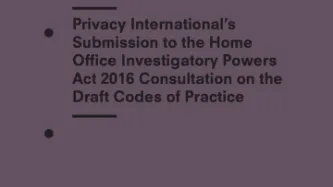Search
Content type: Advocacy
BackgroundThe Snowden revelations and subsequent litigation have repeatedly identified unlawful state surveillance by UK agencies. In response, the UK Parliament passed the highly controversial Investigatory Powers Act 2016 (IPA), which authorised massive, suspicionless surveillance on a scale never seen before, with insufficient safeguards or independent oversight.Privacy International led legal challenges to this mass surveillance regime both before and after the Act became law. The Act…
Content type: Advocacy
The powers set out in the Investigatory Powers Act are wide ranging, opaque and lacking in adequate safeguards. The Government have now published updated Draft Codes of Practice for certain parts of the Act. Unfortunately, the Codes do little to solve the Act’s problems. Instead, they add little transparency, occasionally expand powers, and undermine some of the limited safeguards in the Investigatory Powers Act. These Codes demand close scrutiny. The unusually short timeframe for…
Content type: Advocacy
On 20 March 2015, Privacy International and Open Rights Group submitted comments on the UK Government's draft Equipment Interference Code of Practice.
The UK has been hacking for over a decade, yet the release of the draft Code of Practice is the first time the UK intelligence services have sought public authorisation for their activities. Indeed, it is the first time the intelligence services have publicly acknowledged they engage in hacking.
Unfortunately, the draft Code of…

